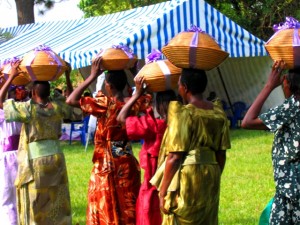Atyono onuke , Uganda’s “Women who are difficult to bury”
Their romance started when they were at Makerere University in 2002. Being in the same class, and from the same tribe, Moses Etuki (not real name) and Mary Akelo (not real name) consolidated their relationship though out their University days.
After graduating last year, Etuki and Akelo wanted to formalize their relationship and start living together as husband and wife.
Etuki went to Akelo’s parents in Soroti district to ask for her hand in marriage. Akelo’s parents asked for five cows, five sheep and five goats as bride price because they knew their future son in-law hadn’t got a job to afford better.
But still, Etuki could not afford the bride price and asked his in-laws to give him Akelo and allow him some time to accumulate the bride price and bring it later. The parents accepted with expected hesitation and caution. Akelo soon became pregnant.
Etuki escorted Akelo to hospital to deliver their first-born, but unfortunately, Akelo died during childbirth in December 2005. The relatives of Akelo came to Etuki’s home to take away 20 cows, as custom requires before they could perform some cultural rites and burry Akelo. This is because her bride price was not yet paid. Among the Iteso of eastern Uganda, such women are culturally called Atyono onuke, meaning the “woman who is difficult to bury”.
This is a deregulatory reference to women who are married to husbands who didn’t pay bride price for them (women). In case such a woman dies, she is not considered like a normal human being and is buried after performing rigorous traditional rites.
Of course Etuki who had failed to afford 5 cows couldn’t afford 20 to allow Akelo’s burial to go ahead. It was only well wishers who wanted Akelo to receive a decent burial that came to Etuki’s rescue, but none forgot the unfairness of the custom.
This is one of the customs surrounding bride price payment that women and human rights activists are basing on to ask for the abolition or reform of bride price practice.
Bride price payment, which is practiced in many African cultures entails a man intending to marry paying money or livestock to the woman’s parents. The practice which is a traditional must for many intending couples to fulfill has of late annoyed many people because of its glaring unfairness to the young partners intending to marry, more especially women.
During a recent international workshop on bride price taking place at Grand Imperial Hotel in Kampala, participants expressed concern that failure to outlaw bride price is maintaining women as property of their parents and husbands, as well as forcing young people not to marry because they cant afford paying bride price. This is on top of reducing the dignity of women who are treated as property to be exchanged or are cursed if they are not paid for like in the case of Akello.
While opening the workshop Justice Margaret Oguli called for the reforming of the practice of bride price in a way that reduces the violence and denunciation that many women suffer because of bride price related customs.
Justice Oguli who launched the MIFUMI Project “Voices for the Future” said that many men who beat up their wives site the fact that they paid bride price for them (women).
MIFUMI is a Ugandan NGO based in Tororo with a vision to see a world free from oppression and the burden of poverty and violence.
She says that many women in Teso region and other tribes suffer a lot of violence from their husbands and stay in sour marriages because they are required to refund the bride price that the husband paid to marry the woman, if the woman were to divorce the husband.
“It is not the woman who demands bride price, she is not the one who receives it, but she is supposed to refund it if the marriage fails. Some women take up to 10 years working in sometimes inhumane conditions to get money to pay back bride price,” Oguli said.
“Right now there are many women from Teso in Kampala suburbs like Kisenyi preparing malwa and other local gins because they want to raise money to go and pay for the bride price after their marriages failed,” she added.
Patrick Ndira, the Head of programs development at MIFUMI UK says because women in Africa are generally perceived to be weak and powerless, many think that it is only through giving bride price to their parents that women can be made valuable.
The workshop that discussed presentations of the bride price network studies was sponsored by The Big Lottery Fund, UK and DFID
Many participants seemed to agree that bride practice culture has become extremely commercialized with parents looking at their daughters as monetary reserves. Some parents are choosing to marry daughters off as young as 14 or to demand the highest price they can name, whether in terms of cows or money.
“Many young ladies are in cohabiting marriages not because they want, but because their partners can’t afford. Some parents are involved in routines of looking for a rich suitor,” said Anne Njogu, a participant from Kenya.
She said a baseline survey in Kisi and Weru provinces of Kenya brought out reproductive issues of women resulting from the practice of bride price. “We found that bride price did accelerate domestic violence, especially marital rape,” she told participants.
Because men pay “highly” for the women they marry, concern was raised that men can do anything they want to women. “A man will say he is beating his cattle (paid as bride price). When a woman wants to stop childbirth in case she has health problems, a man asks: aren’t the cattle I paid still producing? Because of bride price, many women loose all their rights,” said Atuki Turner, Executive Director of MIFUMI project with supporting facts from Tororo.
Pages: 1 2



Pingback: Ultimate Multimedia Consult – Telling Your Story